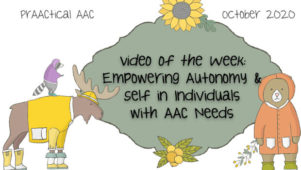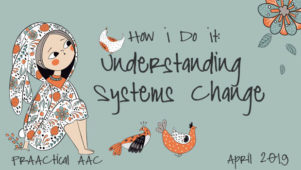Not Good Enough

It’s been a depressing week for us. Too many exchanges with SLPs who should know how to ‘do’ this intervention and don’t. Too many conversations with parents who have not been able to access decent AAC services. Too many delays in getting devices in the hands of clients. We’ll get back to being positive and solution-oriented, but first we need to wallow in the misery of it a bit.
The case for improved services to individuals with little or no functional speech is perhaps best made by those whose voices we cannot hear in a traditional sense. Below is a sampling of quotations from scholarly and personal writings of and by users of AAC.
Michael
Twice a week my academic pursuits were interrupted. I was sent out of the classroom and wheeled down to the other end of the building where I was put into a small, airless room to await the arrival of the school speech therapist. He was a youngish man, full of energy and enthusiasm. He was convinced that he could teach me to speak…He was not the first. There had been others before him…For me these twice weekly therapy sessions were torture. I never doubted the dedication of the people who were working with me. I knew they were sincere and went through many years of education to get where they were. On the other hand, I had been going through this business for more years than I cared to remember…Five more years of blowing candles out; five more years of running through the vowel sounds; five more years of trying to force my unruly lips to form difficult consonants; five more years of attempting singsong nonsense syllables; five more years of failure. I was, as I had been before, still unable to communicate verbally with the majority of people with whom I came into contact. (Williams, 1984, pp. 48-49)
Dawn
I had a few speech teachers. Every speech teacher had their own way of doing things. I was confused. One would say do it this way and another would say do it another way. The last speech teacher I had in elementary school said “O.K., it’s time for a Canon” but the one I had before said “Use speech.” (cited in Smith-Lewis & Ford, 1987, p.15).
Ruth
None of the staff … had noticed my yes-and-no signals until that day, when Wessie discovered them. For more than three years I hadn’t been able to communicate any of my thoughts or feelings to the people on whom I depended for my survival. Back when my parents first brought me to [the institution] they made a point of telling Dr. S. and the others about my facial signals, but no one paid any attention to what they said. They just assumed I was a helpless cripple, and with the constant turnover of staff, the very suggestion that I could communicate was soon lost. (Sienkiewicz-Mercer & Kaplan, 1989, pp.110-111).
Vi’s Family
The day and hour had finally arrived. This was to be the day when the consulting speech pathologist was going to let us know when Vi was finally going to get her augmentative communication system. Anticipation loomed like the hot sticky July air…where we had all gathered to hear the news. Five minutes into his polite but rambling recitation, though, it became apparent that the only news he had for us was no news at all: a glitch had developed here or there…I asked how much longer it’d take to get back on track this time. Why?” he quizzically replied, “Is there any special reason for all the rush???” “No, no special reason,” I said, …”except that she has had 50 years of no special reasons. (Williams, 1989, pp.16-17)
Though they address very different issues, these remarks should serve as a call to arms for improved intervention services for individuals with significant communication difficulties. They are painful reminders that good intentions aren’t good enough, and that the stakes can be very high.
What is it going to take for us to get this right?
Filed under: PrAACtical Thinking
Tagged With: advocacy, rant, transitions
This post was written by Carole Zangari





